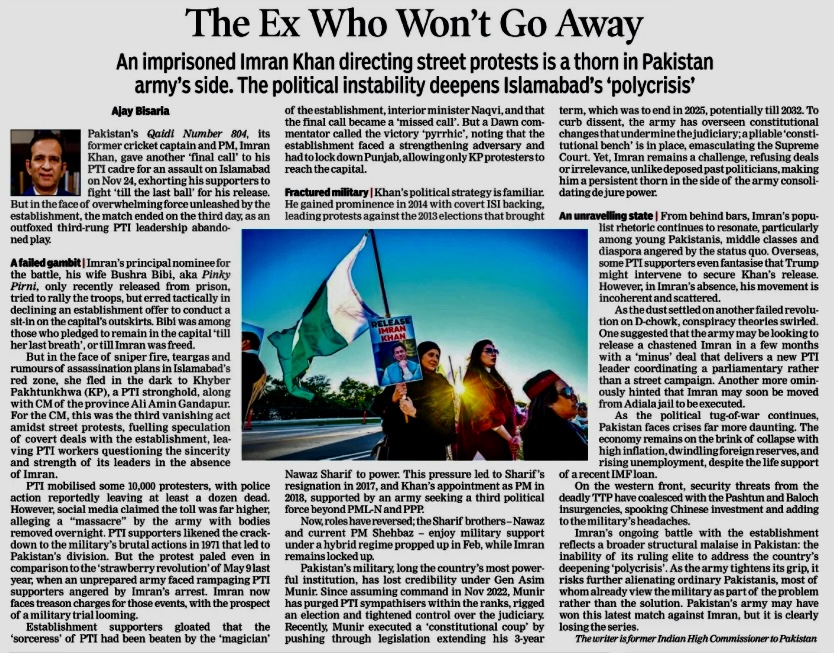Munir’s Dangerous Doctrine
Ultimately, the Munir Doctrine is a dead end. It substitutes belligerence for strategic thinking. It indulges the military’s worst instincts. In trying to cast himself as heir to Jinnah and Zia, Munir is embalming a vision of Pakistan that no longer serves its people—and driving it toward becoming a reckless, war-making garrison state.
Sindoor’s New Red Line
Pakistan, by contrast, embraces external involvement. It needs the optics. It declares every Western phone call a validation of its global stature, just as it rebrands military defeats as victories. The Pakistani military’s propaganda wing, ISPR, will undoubtedly package Op Bunyan Ul Marsoos as an unqualified victory —short war, operational brilliance, and international attention.
The same logic was deployed to claim triumph in 1965, 1971, and 1999, each a setback to Pakistan’s army. What really matters is control of the domestic narrative.
As India celebrates Op Sindoor, a robust debate will take place on strategic choices and operational success. Across the border, Pakistan will project its army chief, General Asim Munir, as a victor. He will expect that this limited conflict has bolstered his authority. It plays into long-standing paranoia about India, casting the army as the nation’s sole saviour.
India has now made a doctrinal pivot in its fight against terrorism. India does not need war—or passive restraint. It has delivered a credible, coercive slap against terrorism. But will that prevent the next Pahalgam? Will it make Pakistan rethink the costs of using terrorism as strategy? For India, deterrence is not about spectacle. It has reshaped the adversary’s calculus.
Pulwama
On Valentine’s Day in February 2019, a convoy of buses carrying paramilitary personnel snaked its way from Jammu to Srinagar on National Highway 44. Just short of Lethapora, a little town in Pulwama district, a loud explosion drowned out the quiet hum of the cavalcade. It was 3.15 p.m. A bloodied Kashmir once again became […]
The Economist: India and Pakistan are bracing for a military clash
During the last big military stand-off between India and Pakistan, in 2019, Mike Pompeo was woken by an urgent call at his hotel in Hanoi. Mr Pompeo, who was then America’s secretary of state, described in a memoir being connected to an Indian minister who said Pakistan was preparing a nuclear strike on India. Mr Pompeo […]
BBC: India and Pakistan are in crisis again – here’s how they de-escalated in the past
Last week’s deadly militant attack in Pahalgam in Indian-administered Kashmir, which claimed 26 civilian lives, has reignited a grim sense of déjà vu for India’s security forces and diplomats. This is familiar ground. In 2016, after 19 Indian soldiers were killed in Uri, India launched “surgical strikes” across the Line of Control – the de facto […]
Why Pak army must now feel the heat
India must re-impose deterrence and reinforce security A lush meadow in Pahalgam was soaked in innocent blood this week, marking the most painful terrorist blow to India since 2008. As investigators confirmed Pakistan’s role in the massacre, 22/4 became another grim reminder that its western neighbour remains India’s primary adversary. Strategic neglect is not an […]
Book Excerpt: Essays in Mutual Comprehension
Manmohan Singh added poetically that this meeting was ‘an essay in mutual comprehension’ and that the two leaders would together write a new chapter in the history of the two countries. Musharraf presented Singh a painting of the school in Gah village (now in Pakistan), the Indian PM’s birthplace, and where he had had his initial schooling. On his part Singh again recited the Urdu couplets which he had read out to Musharraf in their phone conversation.
The Ex Who Won’t Go Away

An imprisoned Imran Khan directing street protests is a thorn in Pakistan army’s side. The political instability deepens Islamabad’s ‘polycrisis’. Pakistan’s Qaidi Number 804, its former cricket captain and PM, Imran Khan, gave another ʻfinal callʼ to his PTI cadre for an assault on Islamabad on Nov 24, exhorting his supporters to ‘fight till the […]
The Print: Pakistan foreign minister was in Delhi on 26/11. India’s only ‘retribution’ was expelling him
With telling revelations, memoir, and account of history, Ajay Bisaria’s Anger Management is a study of the diplomatic engagement between India and Pakistan.
Book Excerpt: A Grab at Kashmir
The 1965 war was born of 1962, which left us looking like bumblers…. We foiled Pakistan’s resulting adventure, doubtless an achievement, albeit limited, but it turned Pakistan to other means: fomenting dissidence in our Punjab, feeding subversion elsewhere, developing terror as an instrument of policy, apart from making life difficult in J&K, while scheming its way to nuclear power. All comprehensively demonstrating an undying obsession—doing India down, wresting J&K.